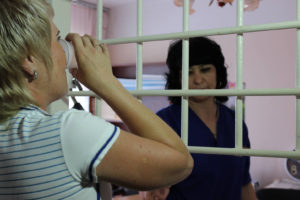
Author: Marina Maximova, Kazakhstan
Since 20 December last year, no new patients have been enrolled in the opioid substitution treatment (OST) programme in Kazakhstan. This decision based on the governmental inspection results led to concerns among civil society activists and medical professionals and to panic among people who use drugs (PUD).
I just want to live!
Her story is a cry for help. Aygul (the name was changed) from Almaty spent half of her 34 years on drugs. There was a time when she was dreaming to become a fashion designer, conquer Paris, meet her love, have children… Then, when she was 17, she tried heroin in a group of other adolescents and could not quit it. Back then she was sure that she could change everything and start her life with a clean slate. It seemed that she had all her life ahead. However, ahead of her there was only a fight for life. Drug abuse, HIV, hepatitis C…
“Due to drugs, I failed to receive an education. I spent my days in jail instead of school. As for my long-awaited love, it was the love for drugs. My dreams were buried together with my unborn babies. My window to Europe was the grilled window in the compulsory therapy department of the drug treatment centre together with other women who were as miserable and weak-willed as I was,” tells Aygul with tears in her eyes.
The only support comes from the woman’s parents who are elderly and exhausted with the daughter’s disease. Aygul hopes to enroll in the opioid substitution treatment programme and receive methadone. Now this dream is falling apart. Aygul was getting prepared, gathering documents. She found a job and believed that she would be able to start a new life. After all, she wants to live so badly!
Insight but not for all
In Almaty – the biggest city in the country – methadone-based OST has been implemented since 2017. It started later than in other cities of Kazakhstan. There was a strong public lobby against it. In less than a year, 15 people were enrolled in the programme with strict eligibility criteria, through the plan was to enroll 50 patients. Considering the estimated number of PUD – over nine thousand – the coverage was extremely low. However, even in this situation PUD and their co-dependent people had a goal and a hope – try to get in the programme and, thus, survive.
As of the end of the last year, 359 people were enrolled in the OST programme in Kazakhstan, including 31 women and 62 people living with HIV. There are success stories: 44 people found jobs, five started families and two female patients became mothers.
“The next steps were anticipated and planned to strengthen OST – approve a programme at the legislative level, launch OST in places of confinement, conduct ongoing monitoring of the patients’ health state. It is proven that methadone therapy has a positive social and psychological effect as people who receive treatment reintegrate into the society. Then, all of a sudden – the programme will not be scaled up, new patients will not be enrolled,” complains Sergey Shetnikov, Substance Abuse Consultant from the Answer NGO based in Oskemen (Ust-Kamenogorsk).
The last chance
In Kazakhstan, the OST programme was started in 2008 with the support of the Global Fund to Fight AIDS, Tuberculosis and Malaria. Within the period of its implementation, the programme was expanded into 13 cities. OST was included into the 2006–2010 National AIDS Programme. Its further implementation was stipulated in the National Programme “Healthy Kazakhstan 2011–2015.” Methadone is registered in the country. Staff is trained. The therapy is provided by multidisciplinary teams consisting of drug treatment doctors, psychologists, social workers, and nurses. The programme was positively assessed by the international organizations – UNODC and ICAP. It seems that there are all the prerequisites for scaling up OST…
“Apart from the recruitment of new clients being suspended, there is one more alarming trend – exclusion of clients. Thus, in Timurtau in Karaganda region the number of clients halved in three months. There are also disturbing signals from other regions of the country. How should people who have been excluded live on? Go back to heroin and jail?” asks Oksana Ibragimova, Advocacy Officer of the Kazakhstan Union of People Living with HIV.
OST for all people who need it may be the last chance for them to go back to normal life, to the society and the family, find jobs and feel that they are normal people.
The Z hour is in a month
Assessments of the OST efficiency and performance in Kazakhstan have been conducted more than once. Now an interagency committee is working, which is to issue its opinion in a month, on the eve of the 22nd International AIDS Conference in Amsterdam (AIDS 2018). Maybe, this decision will influence the attitudes of the Kazakh delegation. So far, some optimism may be derived from the opinion of Nikolay Negay, General Director of the Republican Scientific and Practical Centre of Mental Health at the Ministry of Health of the Republic of Kazakhstan.
“The Ministry of Health of Kazakhstan supports OST. It is one of the key elements of the cluster of drug treatment provision to patients with the opioid dependence. The programme is continued. In future, we hope that it will be implemented in line with the evidence-based international best practices,” he says.



